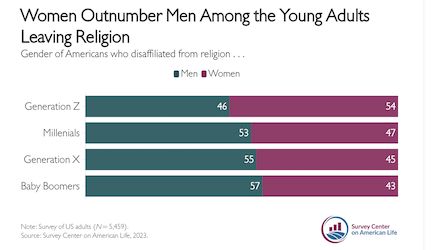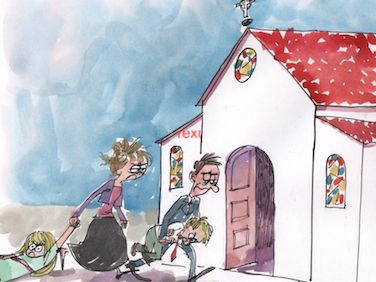Is Jesus home?
Church construction projects are (or at least used to be) a pretty common site, with one springing up on practicually every major road or in every large or small community. As you'd drive by from day to day, you'd watch as the foundation was laid, the walls went up, then the roof, and finally the spire. Not long after, you'd see the cars filling the parking lots and the people coming to inhabit the new edifice.

Several years ago, our church bought a nearby tract of land and began building a much larger sanctuary. In the center of the altar of the new church was a 30-foot-tall obelisk with a cross carved in it. Because of the obelisk's size, it was the first thing installed, and the church had to be built around it. We had to drive by the construction site on the way to the old church.
One day, after the walls were up but the building was not yet completed, my six-year-old daughter looked out the car window at the project. She then turned back and asked, "Has Jesus moved in yet?"
It is a probing question for those who seek forgiveness and grace. Has Jesus moved into your heart yet?
And the corillary akin to it: Does Jesus inhabit the ediface you've so carefully and systematically constructed?
John 6:35–40 (NRSV/ESV-friendly)
“Jesus said to them, ‘I am the bread of life. Whoever comes to me will never be hungry, and whoever believes in me will never be thirsty… This is the will of my Father, that all who see the Son and believe in him may have eternal life, and I will raise them up on the last day.’”
We must ask ourselves, concerning not just our church buildings, but of our own hearts, Does Jesus abide here?
"Here I am! I stand at the door and knock. If anyone hears my voice and opens the door, I will come in and eat with that person, and they with me" (Revelation 3:20, NIV).
Women Fleeing Churches Even As Men Return
The NOT THE BEE (NtB) social news site recently reported that Gen Z women are leaving Christian churches in record numbers, according to a surprising new poll.
But even more surprising is that the recent trend of men exiting the Church en masse, it is now reversing, so even as women are now leaving in record numbers, men are actually returning.
According to the pollsters:
Over the last two decades, which witnessed an explosion of religious disaffiliation, it was men more than women who were abandoning their faith commitments. In fact, for as long as we've conducted polls on religion, men have consistently demonstrated lower levels of religious engagement. But something has changed. A new survey reveals that the pattern has now reversed.

"Men, meanwhile," reports NtB, "seem to be growing into a greater devotion [to] religion in a way that has been unfamiliar to America since the 20th century began." This is evidenced by more findings from the study:
What's remarkable is how much larger the generational differences are among women than men. Gen Z men are only 11-points more religiously unaffiliated than Baby Boomer men, but the gap among women is almost two and a half times as large. Thirty-nine percent of Gen Z women are unaffiliated compared to only 14 percent of Baby Boomer women.
What's more, NtB reports,
This recent study [also] showed 57% of young men want to start a family compared with 45% of young women. It is far from normative for a society to raise such a large percentage of young ladies (who are the gatekeepers for sexual selection and procreation) who do not want to start families.
All of this, on the one hand, spells real trouble for American churches and American culture. As more and more women choose to not procreate, our population, and the rockbed of our society, the family, will continue to shrink or even die. And as women abandon our churches, many of the core functions of those bodies will go unfullfilled.
Volunteer ministries, for example, are largely spearheaded by women. With fewer women, the Church is likely to look different in how it relates to the culture.
Yet, there is a promising silver lining emerging, as young men return to the church, and return to their love for and desire for family.
Let us pray the Lord will use this generation of young men to hold the line, reassert themselves as strong husbands, fathers, and church leaders (even as they assume many of the volunteer positions traditionally held by women). And let's pray for this generation of young women, to rediscover their critical roles in our churches and families. Finally, pray for the Church as a whole, that it will likewise hold the line of truth and genuine spirituality, so these young men and women have someplace to come back to.
"And let us not neglect our meeting together, as some people do, but encourage one another, especially now that the day of his return is drawing near" (Hebrews 10:25, NLT).
Made to Attend Church
So you don’t attend church today because you were forced to attend as a child? Such is the common complaint that I hear when the subject of church comes up with the unchurched. I understand. You were made to go. The only drug problem that your parents had was that they “drug” you to church. You didn’t particularly enjoy it, except for the Easter candy, the Christmas program, or maybe catching the eye of that pretty girl.
But the long, boring sermons were punishing. The Sunday School teacher thought you had a rotten attitude, and publicly called you out. You didn’t like wearing dressy clothes. And when the preacher talked, it seemed that he was looking right at you. You couldn’t stand singing in children’s choir and the list goes on.
So now, you refuse to attend. Furthermore, you resent the fact that your parents made you attend and have stalwartly determined NOT to require your children to attend church on the basis of allowing them to “make their own decisions.”
I understand. After all, that the church has been viewed as being too religious, judgmental, packed with hypocrites, and besides all that, they seem to want your hard-earned money.
While it may be true that the church, in general, has needed an overhaul in some ways, I would like to challenge you to consider another angle.
My parents not only made me attend EVERY church service (minimum of 3 days a week plus revival services), including extra youth service and prayer meetings, but they also made me carry my Bible. I brought an offering to Sunday School that came out of my allowance and had to memorize Bible verses. If we misbehaved in a church service, it might be that we were called out from the pulpit, or a “(h)usher” would attend our side. Rain or shine, we were in church!

But please indulge me a bit longer. Perhaps my parents would have received a visit from DHS if it were known of the other cruelties that they imposed upon my young life. You see, they frequently “forced” me to do other things that I definitely would have chosen not to do if I had a choice. Let me give you the short list:
My cruel and inhumane parents “forced” me to do other things that I definitely would have chosen not to do if I had a choice:
- “Forced” me to attend school. Not just 3 times a week, but every weekday.
- They made me go to the Dentist, the Doctor, the family reunions, and the mall to by new shoes.
- I had to visit the nursing home when they went and be fawned over by old ladies who smelled funny.
- If I got in trouble at school, I usually got in worse trouble when I came home.
- When I got home, there were certain things I was required to do call “chores.”
- They forced me to do the homework that came with school.
- We were required to sit down as a family every evening for a meal in a room where there was no TV
- There were the gross and disgusting things call vegetables that we were required to wash down before we could have any desert.
- We were encouraged to go outside and play with the dog on nice days.
- We were required to take baths, brush our teeth, and clean up after ourselves.
- Before we left for school, we had to make our beds.
- We were required to make peace when we had disagreements with our siblings. Like brush my teeth. Take a bath. Eat my vegetables. Be nice to my siblings. Share. Lift the lid. Close when finished. Tuck your shirt in. Get out of bed. Get a haircut. Get good grades. Get an attitude adjustment. Get a job. Wow! Come to think of it, I guess my parents were downright abusive! Right.
Thank you, mom and dad, for being so harsh. Your tough love made me the man I am today.